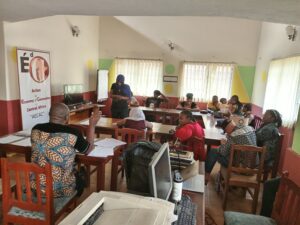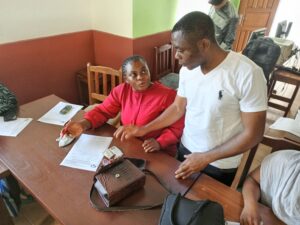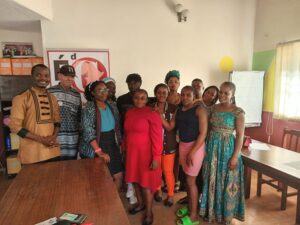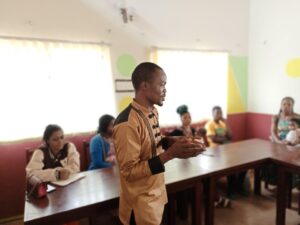Socio-economic training of IDPs Yaoundé, November 14, 2022
 Association Action pour l’Economie de Communion en Afrique Centrale (AECAC): second phase of the project for the empowerment and socio-economic integration of IDPs in the Northwest and Southwest.
Association Action pour l’Economie de Communion en Afrique Centrale (AECAC): second phase of the project for the empowerment and socio-economic integration of IDPs in the Northwest and Southwest.
On Monday 14, 2022 the AECAC office hosted a training for 15 internally displaced of Yaoundé who qualified for this phase 2 training session.
Yaoundé the Capital City of Cameroon, is an excellent place to experience the social transformation happening in the Country, with its many faces and complexities, it is home to hundred thousands of Internally Displaced Persons since the so called Anglophone crisis in Northwest and Southwest regions.
Just like all other cities of the Country, Yaoundé too is adapting to the addition of hundreds of the displaced seeking safety.
In this City people have the possibility to “rebuild” their lives, to regroup, build new identities and why not forge socio-political awareness that aim to bring peace back to places they had to abandon because of conflict.
It is in this context that the Association Action pour l’Economie de Communion en Afrique Centrale (AECAC) promoted a project that proposes means for the empowerment and socio-economic insertion of Internally Displaced Persons, so that they can take care of their vital needs in this big City with its characteristics. Sustainability – the cost of living that might be higher than other towns, lodging with house-rent might as well present different challenges than other places. Schooling for children and youth is another reality.
 To cope with such issues and others, beneficiaries of the project run different small business for their income generating activities.
To cope with such issues and others, beneficiaries of the project run different small business for their income generating activities.
During the training session each beneficiary was given time necessary to share his/her personal story with each other and with the two facilitators of the programme Steve Azeumo, and Tiku Martin. These touching stories of resilience, courage and determination provided the basis for the training.
I lively dialogue between the trainees and the facilitators made its way into a real formation and skills learing.
Quinta is a nutritionist, mother of 2 children, she and her children are having it rough in this big City where she has no house, and she works during the day and at night she sleeps at her friends’ places and at times at well-wishers’ places, for she cannot yet afford house rent, no stable job after having fled and left everything she had behind, in search of safety. Two months ago she managed to gather some money and started to sell cooked food. She is determined to find a place of her own very soon, reason why she need support to carry on her activity.
Elisabeth does markings on traditional attires, together with her two younger sisters. She has worked tersely for about 2 years. She would like to have a sewing machine so as to grow her business. Catherine sells groundnuts. Even if the market is slaw, she would like to continue her business if she get capital.
Catherine sells groundnuts. Even if the market is slaw, she would like to continue her business if she get capital.
Geraldine makes pastries, after an accident she had to spend good part of her humble savings for her medical bills but she is not relenting. For now she does her baking with a capital of 5 kg of wheat-flor Roland is 24 year old, when the crisis broke he was still in high school. He had to relocate to Kribi and then to Yaoundé in hope of finding a job. He is now learning to work in a barber-shop. He said he needs support to work as a barber.
Though sincere and open dialogue with facilitators, training sessions resulted into listening intensely to the really needs, desires and aspirations of beneficiaries.
Sonita is 18 old, she arrived in Yaoundé 2 years ago. She hasn’t been in school for the last 2 years. She does marking on traditional attires with her sister for her upkeep, but her strong desire is to go back to school. So, her request to the project is a support to go back school in the afternoon so that in the morning she can work for her upkeep.
In other cases, the dialogue opened up to the need of advocacy, this was for instance the case of Bertila a Nurse student, mother of 3 young children. For a living, and to afford her children’s school fees, she does beadwork; that is used to create accessories like necklaces, bracelets, pendants, anklets, belts as well as home décor and a number of household. In order to complete her Nursing course, she needs to do internship but she cannot afford to pay the fee.
In order to complete her Nursing course, she needs to do internship but she cannot afford to pay the fee.
Others pressing issues underlined were: discipline, savings microcredits finance and bank accounts. Assunta has a small a shop. The facilitation brought forth the importance of business license to be in order with the laws and regulations of the City Council. She concluded: “I need technical support”.
The training ended successfully, each beneficiary was encouraged to make his/her business plan, a skill that was appreciated, to focus and be results orientated.
As Bertila put it: “this training session was about business and financial education but it was also an emotional support session”, they left with the desire to continue networking.
ABOUT US
AECAC ( Action for Economy of Communion in Central Africa )
- Registration
N°966/RDA/J06/SAAJP/BAPP - BUSINESS INCUBATOR, Approval of Cameroon Government: Ministry of Small and Medium-Sized Enterprises, Social Economy and Handicrafts
N°22/00046/D/MINPMEESA/SG/DAJ du 15 Juin 2022
ALL CONTACTS
Yaoundé- Omnisport
Town: Yaoundé- Cameroon
BP: 5682 Nlongkak
+237 696521171
secretariat@aecac.org
08 am - 05:30 pm Monday-Saturday
PAGES
- Home
- About us
- Projects on incubation
- Support our projects
- Contact
- Legal mention
© 2021 AECAC incubator
Made by Armand TEGOMO VOUKENG

Leave a Reply